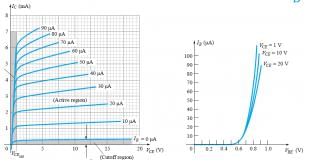Test: BJT Configuration - Electronics and Communication Engineering (ECE) MCQ
10 Questions MCQ Test - Test: BJT Configuration
For a BJT, for common base configuration the input characteristics are represented by a plot between which of the following parameters?
In a BJT, if the collector-base junction is reverse-biased and the base-emitter junction is forward-biased, which region is the BJT operating in?
In a BJT, if the collector-base junction and the base-emitter junction are both reverse-biased, which region is the BJT operating in?
From the given characteristics, what is the approximate value of IC at VBE=0.7 V and VCE=15 V?

For a BJT, for common base configuration the output characteristics are represented by a plot between which of the following parameters?
In a BJT, if the collector-base junction is forward-biased and the base-emitter junction is forward-biased, which region is the BJT operating in?
Which of the following correctly determines the relation between α and β?
For common emitter configuration, which of the following is the correct relation?
In a pnp-BJT, when the E-B junction is forward biased and no voltage is applied across C-B junction, what happens to the width of the depletion region in the E-B junction?
Which of the following statements is true about proper functioning of a BJT?














